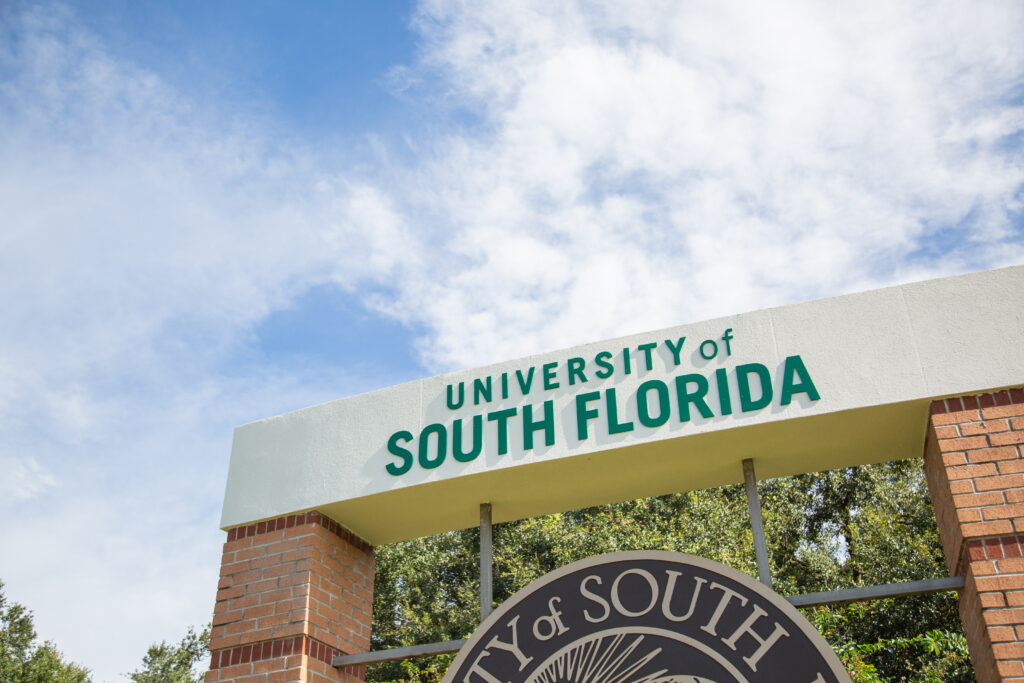USF Respectful Responders program shifts role as mask requirement lifted

With the growing concerns about mask-wearing and potential conflicts that may arise, the university has revived a program focused on training staff to intervene in verbal disagreements to ease such situations.
Last fall, the university launched the Respectful Responders program to equip faculty and staff with tools to resolve any sort of conflict related to noncompliance with the university’s coronavirus safety measures.
However, now that there is no obligation to wear a mask, the program shifted its focus to deal with disagreements that could escalate over the use of face masks around campus. Dean of the College of Public Health Donna Petersen said the suggestion to revive the program in the fall came from concerns of community members due to a surge in COVID-19 cases across the state.
“If someone won’t wear a mask, that might concern someone who is wearing a mask,” Petersen said. “And so we may in fact have some tough conversations in a situation where someone is exercising the right to not wear a mask.”
About 150-175 volunteers, which include faculty and staff across campus, completed a training Aug. 19 on strategies to use when intervening in any conflict, especially arguments over face masks, USF’s Student Ombuds Jennifer Schneider said.
“The truth is they may not ever call and that … has been the case that our numbers were very low of actual incidents [during fall 2020 and spring 2021],” Schneider said. “But we wanted to be able to give faculty an opportunity to get help de-escalating, so that teaching and learning isn’t disrupted whenever there might be an issue.”
Strategies include using a calming tone and language while speaking with the individuals involved or staying quiet for 10 seconds if a conversation starts to heat up before refocusing it.
Some volunteers, including Dean of the College of Nursing Usha Menon, have been Respectful Responders since fall 2020. She said that people who got in an argument about the current safety guidelines could call the respectful responders through posted phone numbers in every classroom and across colleges.
“If they ever feel uncomfortable having a conversation with somebody, or they get into some sort of argument about the philosophy of what we should be doing, they have a number they can call you and only takes about five minutes to get anywhere in our building,” Menon said. “Our job is really to sort of de-escalate the situation, offer solutions and offer help.”
Although Menon hasn’t had to respond to any conflict in her college yet, she said the training could be helpful for similar instances given the current division across the country over COVID-19 safety measures.
The strategies learned are helpful for conflict resolution in any area, Michele Walpole, assistant director of the Doctor of Business Administration Program, said.
Vonzell Agosto, professor at the College of Education, also saw the training as an opportunity to learn about the methods other people use to solve conflicts. Her takeaway as a respectful responder is that their role is to listen to the different positions rather than force someone to do something.
“We also have to think about how we can protect them, have safety in the class from one another, not just physical safety, but emotional safety,” Agosto said. “So that people feel like we’re not trying to make people do something that they’re not required to do. We’re trying to explain the situation [by] answering questions [and resolving] anything that might become a further distraction.”
Melony Herron, building manager at the Muma College of Business, said the training was a reinforcement of common sense around such topics. She was advised to volunteer and, at first, she was not sure about it as she believed University Police (UP) should be the ones dealing with confrontations.
“I just wasn’t sure that that was a job for staff and faculty to deal with in that place because you never know,” Herron said. “If you look on social media and the news, you never know what you’re going to encounter. The mask and vaccine diversity we have right now is crazy.”
Volunteers were told that, if they are threatened, people start acting violent or there is disruption of USF academic functions, they can call UP to intervene and resolve the conflict. Herron said she was “somewhat OK” knowing authorities would step up if things went wrong.
“I guess it was the training that kind of put me at ease,” Herron said. “Not that they gave me words that I didn’t really already know how to use, but just knowing there were a lot of people doing this, I wasn’t the only one.
“I still feel that it’s probably not the job of the faculty or staff member to break up a fight. That should be dealt with by [UP]. But I also understand that potentially there would be a lot of calls to the police department where we could maybe ease that you know for them.”
Still, volunteers like Walpole said they feel the program is useful in case they need to intervene in any situation.
“I think it’s great because like I said, it really hasn’t been that much of a challenge,” Walpole said. “So far students are pretty respectful as they are. And the faculty also. And I have been able to use some of the information in other areas. It’s good information for anyone to have. It’s good training for anyone to know.”







